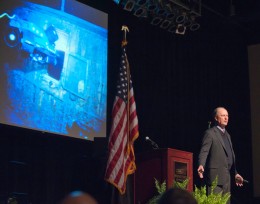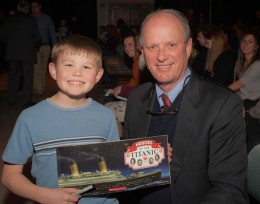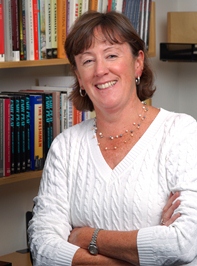
Titanic discoverer Robert Ballard spoke about his many deep-sea explorations. His lecture was part of both the Honors Institute and the Presidential Lecture Series.
It was a full house in the Student Union Apollo Room. Students, faculty, staff and members of the community filled every available seat and even lined the edge of the room as they eagerly awaited the keynote address of Wright State’s annual Honors Institute.
The speaker was none other than Robert Ballard, Ph.D., the deep-sea explorer famous for his 1985 discovery of the R.M.S. Titanic’s wreckage.
Next month will mark the 100th anniversary of the Titanic’s tragic sinking, but it was evident from the crowd that time has not diminished the public’s fascination with the doomed luxury liner.
Several children attended, clutching copies of Ballard’s many books about his discovery. A woman came wearing a replica of the “Heart of the Ocean,” the necklace from James Cameron’s Oscar-winning film Titanic. A man brought with him a scale model of the historic ship. Titanic fever was alive and well in the room.

Many young fans brought copies of Ballard's books to the event. Ballard said he hopes his research gets students excited about science.
But it was Ballard’s other discoveries that received the most attention at the lecture. Ballard spoke of his expeditions to find 1,500-year-old wooden ships in the Black Sea and his exploration of the Mid-Ocean Ridge, an underwater mountain range that helped confirm the theory of plate tectonics.
“We have better maps of Mars than we do of our oceans,” said Ballard. “We played golf on the moon before we saw some of the most interesting places on our own planet.”
Ballard also spoke of his efforts to excite today’s schoolchildren about science. Ballard’s JASON Project connects students with researchers virtually in real time through the Internet, allowing them to join in live oceanography expeditions.
“We have no problem getting our kids to worship athletes, singers and celebrities,” he said. “We’re a culture of stars. We just need better stars, scientists and engineers for our kids to idolize.”
Ballard’s presentation, part of Wright State’s Presidential Lecture Series, was also the keynote address for the university’s annual Honors Institute.

Cornelia Dean is a science writer for the New York Times, where she writes mostly about environmental issues and science policy, and a lecturer in the School of Engineering and Applied Sciences at Harvard University.
This year’s Honors Institute featured a day-long symposium on “Exploring the Oceans.” Participants heard from a variety of presenters, including economists, marine biologist, historians and English professors.
Presented by the Wright State University Honors Program, the academic conference included six breakout sessions. Attendees explored the oceans from an interdisciplinary perspective and featured topics such as Military Sea Power, Life in the Oceans and the Literature of the Seas.
New York Times science writer Cornelia Dean spoke during the symposium’s luncheon about the erosion of America’s beaches and the dangers it poses to the American economy.
The annual Honors Institute is a multi-track learning experience available to honors students. Classes are offered during Winter Quarter that complement the theme of the institute. For example, this year students could take a course on memoir literature or world wars in modern history. The symposium itself is designed to expose students to a scholarly conference setting.

 Wright State faculty member Damaris Serrano wins Panamanian literary award
Wright State faculty member Damaris Serrano wins Panamanian literary award  Wright State grad Hannah Beachler earns Oscar nomination for production design on ‘Sinners’
Wright State grad Hannah Beachler earns Oscar nomination for production design on ‘Sinners’  Wright State alum Emily Romigh builds on a family legacy in education
Wright State alum Emily Romigh builds on a family legacy in education  Wright State receives $3 million grant to strengthen civic literacy and engagement across Southwest Ohio
Wright State receives $3 million grant to strengthen civic literacy and engagement across Southwest Ohio  Fitness Center renovation brings new equipment and excitement to Wright State’s Campus Recreation
Fitness Center renovation brings new equipment and excitement to Wright State’s Campus Recreation 